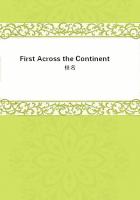(who cites the Vienna Pamphleteers, without much believing them);Mailath (a Hungarian), <italic> Geschichte des OEsterrichischen Kaiser-Staats <end italic> (Hamburg, 1850), v. 11-13 (who explodes the fable). Cut down to the practical, it stands as above:--by no means a bad thing still. That of "bringing in Baby" was a pretty touch in the domestic-royal way;--and surely very natural; and has no "art" in it, or none to blame and not love rather, on the part of the bright young Mother, now girdled in such tragic outlooks, and so glad to have Baby back at least, and Papa with him! It is certain the "Insurrection" was voted with enthusiasm; and even became rapidly a fact. And there was, in few months hence, an immense mounted force of Hungarians raised, which galloped and plundered (having almost no pay), and occasionally fenced and fought, very diligently during all these Wars. Hussars, Croats, Pandours, Tolpatches, Warasdins, Uscocks, never heard of in war before: who were found very terrible to look upon once, in the imagination or with the naked eye; but whose fighting talent, against regular troops, was next to worthless; and who gradually became hateful rather than terrible in the military world.
HANOVER, SEPTEMBER 27th. Britannic Majesty, reduced to that frightful pinch, has at last given way. Treaty of Neutrality for Hanover; engagement again to stick one's puissant Pragmatic sword into its scabbard, to be perfectly quiescent and contemplative in these French-Bavarian Anti-Austrian undertakings, and digest one's indignation as one can. For our Paladin of the Pragmatic what a posture! This is the first of Three Attempts by our puissant little Paladin to draw sword;--not till the third could he get his sword out, or do the least fighting (even foolish fighting) with all the 40,000 he had kept on pay and subsidy for years back.
The Neutrality was for Hanover only, and had no specific limit as to time. Opportunities did rise; but something always rose along with them,--mainly the impossibility of hoisting those lazy Dutch, --and checked one's noble rage. His Majesty has covenantad to vote for Karl Albert as Kaiser; even he, and will make the thing unanimous! A thoroughly check-mated Majesty. Passing home to England, this time in a gloomy condition of mind, shortly after these humiliations, he was just issuing from Osnabruck by the Eastern Gate, when Maillebois's people entered by the Western,--the ugly shoes of them insulting his kibes in this manner. And a furious Anti-Walpole Parliament, most perturbed of National Palavers, is waiting him at St. James's. Heavy-laden little Hercules that he is!
Karl Albert lay at Linz for a month longer (till October 24th, six weeks in all); pausing in uncertainties, in a pleasant dream of victory and sovereignty; not pouncing on Vienna, as Friedrich urged on the French and him, to cut the matter by the root. He does push forward certain troops, Comte de Saxe with Three Horse Regiments as vanguard, ever nearer to Vienna; at last to within forty miles of it; nay, light-horse parties came within twenty-five miles.
And there was skirmishing with Mentzel, a sanguinary fellow, of whom we shall hear more; who had got "1,000 Tolpatches" under him, and stood ruggedly at bay.
Karl Albert has been sending out sovereign messages from Linz:
Letters to Vienna;--one letter addressed "To the Arch-duchess Maria Theresa;" which came back unopened, "No such person known here."October 2d, he is getting homaged at Linz, by the STANDE of the Province,--on summons sent some time before,--many of whom attend, with a willing enough appearance; Kur-Baiern rather a favorite in Upper Austria, say some. Much fine processioning, melodious haranguing, there now is for Karl Albert, and a pleasant dream of Sovereignty at Linz: but if he do not pounce upon Vienna till Khevenhuller get it fortified? Khevenhuller is drawing home Italian Garrisons, gradually gathering something like an Army round him.
In Khevenhuller's imperturbable military head, one of the clearest and hardest, there is some hope. Above all, if Neipperg's Army were to disengage itself, and be let loose into those parts?
EXCELLENCY HYNDFORD BRINGS ABOUT A MEETING ATKLEIN-SCHNELLENDORF (9th October, 1741).
It was the second day after that Homaging at Linz, when Hyndford (Sept. 22d) with mysterious negotiations, now nearly ripe, for disengaging Neipperg, waylaid his Prussian Majesty; and was answered, as we saw, with "Tush, tush! Dinner is already cold!"It must be owned, these Friedrich-Hyndford Negotiations, following on an express French-Prussian Treaty of June 5th, which have to proceed in such threefold mystery now and afterwards, are of questionable distressing nature: nor can the fact that they are escorted copiously enough by a correspondent sort on the French side, and indeed on the Austrian and on all sides, be a complete consolation,--far otherwise, to the ingenuous reader.
Smelfungus indignantly calls it an immorality and a dishonor, "a playing with loaded dice;" which in good part it surely was.
Nor can even Friedrich, who has many pleas for himself, obtain spoken acquittal; unspoken, accompanied with regrets and pity, is all even Friedrich can aspire to. My own impression is, Smelfungus, if candid, would on clearer information and consideration have revoked much of what he says here in censure of Friedrich. At all events, if asked: Where then is the specifical not "superstitious"WANT of "veracity" you ever found in Friedrich? and How, OTHERWISEthan even as Friedrich did, would you, most veracious Smelfungus, have plucked out your Silesia from such an Element and such a Time?--he would be puzzled to answer. I give his Fragment as I find it, with these deductions:--"What negotiating we have had, and shall have," exclaims Smelfungus, my sad foregoer,--"fit rather to be omitted from a serious History, which intends to be read by human creatures!















